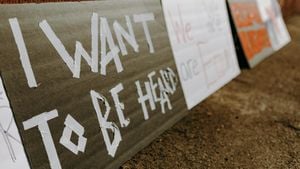For years, Iranian film director Mohammad Rasoulof has wielded cinema as his form of dissent against the oppressive regime of his homeland, weaving narratives rich with sociopolitical themes and human rights issues. Yet now, his own story has taken a terrifying twist, plunging him deep within the shadows of repression. Following the sentencing of Rasoulof to eight years in prison, he has been forced to flee Iran, marking the end of his life as he once knew it.
Rasoulof’s troubles began to escalate earlier this year during the shooting of his latest film, "The Seed of the Sacred Fig." According to reports, just weeks after starting production, he received devastating news. The Islamic Revolutionary Court had processed multiple charges against him due to his prior films and activism, resulting in the harsh sentence of eight years. Feeling the clock ticking, Rasoulof pressed his lawyers for answers. They revealed the unsettling reality: the filing of his appeal could take up to two months, but unexpectedly, the court decided against the appeal, demanding he start serving his sentence immediately.
Unlike many artists forced to flee oppressive regimes, Rasoulof had never been one to seek refuge outside of Iran. For him, the vibrant cultural and political backdrop of the country inspired much of his work. He had previously faced imprisonment for seven months back in 2022, following his participation in protests advocating for reform. After such visits to prison, he had returned to creating films, finding within those experiences both inspiration and purpose. This time, though, the stakes were undeniably higher. The looming threat of additional charges for his current project pressed down upon him, curtailing any hope of resuming his career should he be imprisoned.
Rasoulof’s resolve to escape was born out of sheer survival. He had learned from another inmate about informal networks helping persecuted citizens navigate their way to safety. Reaching out to these people, he was instructed to walk away from most of his possessions, taking only the essentials. With nothing but the clothes on his back and few personal items, Rasoulof met with his escape coordinators near Tehran.
His escape was far from straightforward. Hidden away from prying eyes, Rasoulof was transported through desolate paths, making his way to anonymity. He eventually reached a bordering village and settled there temporarily, but not without complications. Suspicions surrounding his presence arose among the locals, leading to tension with the very network aiding his escape. Rushed negotiations ensued to secure his passage, culminating at midnight when Rasoulof was once again on the move, this time across treacherous terrain leading to the nearby country.
While the underground network mobilized efforts to assist Rasoulof, the psychological weight of his flight plunged heavily upon him. There was the nagging uncertainty, paired with the unavoidable grief of leaving behind the very essence of his identity—his home, his family, his art. Reports of such intentional silencing are not uncommon for artists and activists living under the pervasive shadows of Iran’s regime. With Rasoulof’s case gaining international attention, reflections on the significance of his work and the regime’s fearful tactics are resurfacing, raising questions about the cost of artistic freedom.
Just as Rasoulof’s past works reflected the turbulence of Iran's society, his tragic narrative serves as both caution and call to action for many others facing similar predicaments. This saga isn’t just about one filmmaker; it reveals the broader climate of fear running rampant against those who dare to challenge authority through the arts. Iran’s political atmosphere has steadily infiltrated every aspect of life, stifling creativity under the pretext of national security and moral rectitude.
Solidarity for Rasoulof has begun to emerge from various regions of the world, with numerous human rights organizations condemning Iran’s actions against artists and activists. They highlight the absurdity of punishing creative expression and the political motivations underlying these changes. Such figures, like Rasoulof, who use their craft as commentary against governmental abuses, illuminate the necessity for global awareness and action.
Another dimension to Rasoulof’s flight lies within the broader conversation about the treatment of dissidence within authoritarian regimes. Many within the Iranian diaspora have expressed support for his cause, emphasizing the need for creative freedom as intrinsic to the pursuit of democracy and justice. Their outcry reinforces the notion of solidarity among those resisting oppressive structures and supports the grassroots movements pushing for changes within Iran.
Back within Iran, the question remains: what will happen next for those who continue to create art under threat, much like Rasoulof? For now, he is safe, but the haunting reality of his situation—the freedom gained outside of Iran juxtaposed against the oppression still faced by countless others—is never far from his mind. The world watches and listens to stories like his, hopes fleeting but prayers rising for those who dare to dream of freedom amid heavy persecution.
The next chapter of Rasoulof’s life is yet to be written. Wherever he ends up, one thing seems clear: his voice, shaped by suffering, will continue to challenge and inspire, conveying the stories of those silenced, illuminating the darkest corners of injustice. He might be physically away from Iran, but the heartbeat of his country, its people, and their plight is forever embedded within his art.



